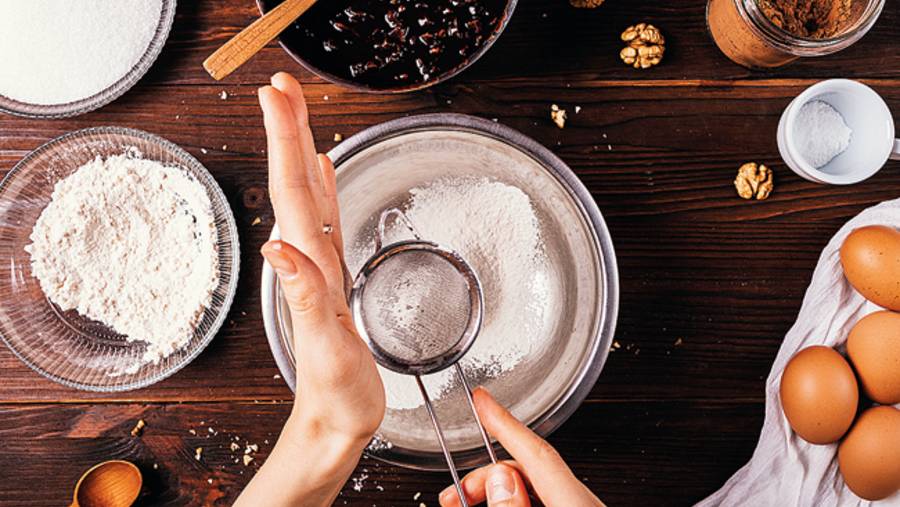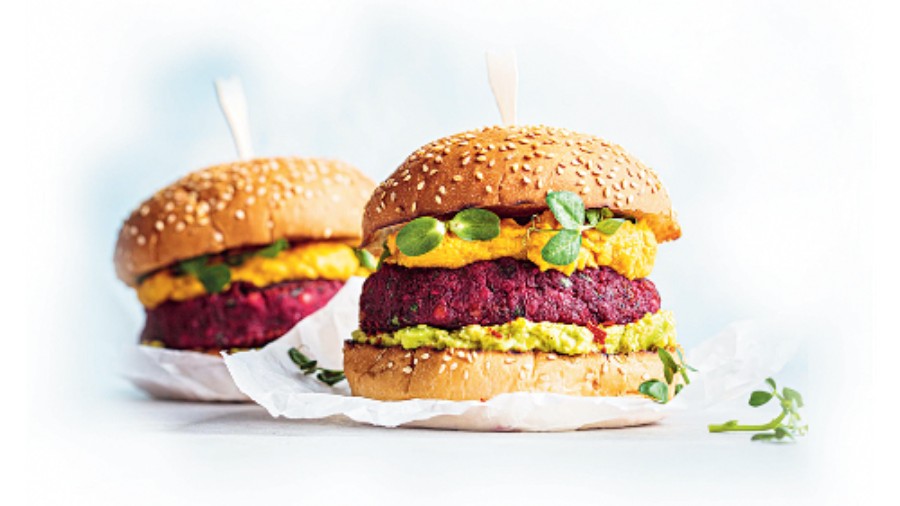I tried making the Peanut Butter Cheesecake Brownie from your last column that turned out to be quite delicious. Just wanted to ask you whether you would prepare some Bengali dishes in the near future and share the recipes for the same.
Thank you for the thumbs up. When it comes to any of the Indian cuisines, I have always tried to avoid going in a traditional direction, for two reasons. There are thousands of great Indian cooks and chefs out there and most importantly, I don’t want to get into the almost-political argument, particularly with Bengali food regarding why is some gora chef cooking Bengali food. Even if I do say so myself that I am a very good jamai and you can ask my mother-in-law to clarify but even more so, those debates about “our family recipe quite clearly says and is the best because…”, or, “why would anyone add rocket leaves to a khichri….” (works really well by the way, just stirred in at the end). But yes, maybe for my next article, I am willing to have a go at some basterdised classics, bordering more towards modern Anglo Indian if you would be happy with that.
It’s probably very basic but since I always seem to get it wrong, what is the trick to make a perfect poached egg? Do I use a similar method to poach chicken too?
So I am going to say, yes. I have made my fair share of classic poached eggs over the years, particularly in my younger chef days. I remember a youngster and I having to poach 1,500 for a sit-down banquet when I was on industrial placement at the Connaught in London, many decades ago. It took us two 14-hour days and we must have poached at least 2,500 and cracked open another 500 to get the 1,500 perfect ones. Poaching, chilling in iced water, lining up on trays and cling filmed to be re-poached to heat through as the starter was sent out of the kitchen. If I barely knew how to poach an egg before, I certainly walked out of the hotel as a sweet 17-year-old, head held poachingly high!
But after rambling all of that, if you are going to be doing this at home then it’s best to do it as my wife does every morning for breakfast — butter the inside of a ramekin or cup and break in one egg with a little salt and pepper sprinkled over the top. Place this into a saucepan in around a half-inch of water at the bottom. Place on a lid, bring to a boil and simmer for three minutes for a nice, soft runny yolk or five minutes for hard. As simple as that and no fiddling around with the swirling salted, vinegared water that you have to stand over and carefully spoon out and drain.
As for chicken, if you really do want to poach, then you will need to make a broth of some sort to impart some sort of flavour and you will have something to make a soup with later. Otherwise, all of the chicken flavour will be left in the water. I did post a recipe for a whole poached chicken last week but generally for me, I do think that chicken and fish are much better steamed, as the Chinese and South East Asians do. Then you don’t lose any of the goodness.
I love how olive oil is so light but when I use it to fry meat or fish, there’s a strong taste sometimes. Am I not using the oil correctly?
I am guessing you are using extra virgin olive oil. It has a punchy, peppery, almost bitter taste sometimes and does tend to overpower many things. If you are using extra virgin olive oil, all the goodness in it is lost once heated. It’s really only used as a sprinkle or dressing. For frying, use a light or pomace olive oil. It’s much cheaper and relatively neutral in flavour.
Is there a marinade that can be used for pretty much all kinds of meat like mutton, pork and even chicken?
When you are talking about marination, I am guessing you are going to use it for grilling or pan-frying. If so, I think the best marinade, at least in the western kitchen, is just simply salt, cracked black pepper and olive oil. Liberally coat it and place in an airtight container in the refrigerator overnight. The salt will help tenderise and please feel free to use any masala of your choice here. I use it all the time at home for chicken breasts. Total chicken as a preference for quality and freshness but if you are planning to use pork, beef or lamb, make sure you use the tender cuts like the tenderloins.
I just grill in a smokingly hot non-stick, dry fry pan for exactly three minutes each side and again placed into an airtight container for half-an-hour. This allows the protein to rest and continues the cooking perfectly with the residual heat. The chicken will have a lovely moist texture.

Sourced by the correspondent
I baked a cake for the first time during the lockdown, following all steps carefully but it collapsed at the centre. Can you help me understand what can be the reason behind that?
Many problems can occur when baking a cake but the problems are usually either that the recipe or method, or the process isn’t good; your oven wasn’t pre-heated or didn’t reach the proper temperature or, you were supposed to bake it in a 10-inch round tin, 1-inch in depth and you baked it in loaf tin 2-inch deep and it didn’t have enough time in the oven to cook through.
Here is a foolproof basic cake mix that even a six-year-old can make as long as you follow it to precision. Chocolate, dried fruits, nuts, citrus zest among other can be used if you like.
Ingredients:
• Unsalted butter, softened and extra for greasing, 250g pack
• Caster sugar, 250g
• Vanilla extract, 1tsp
• Eggs, 5
• Plain flour, 85g
• Greek yoghurt or hung curd, 100g
• Self-raising flour, 250g
• Plain flour, 1tbsp
• Milk, 3tbsp
Method:
• Preheat the oven to 160°C. Grease a round, deep 10-inch round cake tin and line the base and sides with non-stick baking paper.
• Using a electric beater or tabletop mixer, or a wooden spoon if necessary, beat together the butter, sugar and vanilla until pale and fluffy.
• Break the eggs in, one at a time, giving the mix a good beating. Add plain flour, if the mix starts to separate.
• Beat in the yoghurt and using a large metal spoon, sift and fold in the flour, followed by the milk.
• Spoon the mixture into the tin and bake for one hour and 20 minutes, or until well risen and golden. A skewer inserted into the middle should come out clean.
• Cover with a damp cloth to keep it nice and moist while cooling, then left to cool completely.
l Store in an airtight container and eat at leisure. It will last for ages in the refrigerator and freezes well. You can also split it down the centre and fill with cream or buttercream.
I have recently turned vegan. Any suggestions on how to make a vegan dish taste meaty and cook without too many ingredients?
I have also been toying with the idea of becoming vegan but it really is a tough task with my job unfortunately, but I have been playing around with recipes over the last couple of years and I have also been trying to understand how to add a deep, savoury, umami element.
Soy sauce, miso paste, fermented black beans, roasted garlic etc all have incredible depth of flavour. I also think celery and hardy herbs like thyme, rosemary, sage, all add a really savoury element when added to recipes and sauces.
Here is a recipe that I developed for a brand a few years ago and till today, I think it is one of the best vegan burgers I have eaten. It has loads of texture, it’s savoury, almost meaty and because of the beet, does resemble a meaty beef burger.
Ingredients:
• Finely chopped walnuts, 150g
• Mushrooms, 200g
• Garlic powder, 1tsp
• Finely chopped onion, ½
• Cooked rice, 200g
• Dry soya granules, 30g
• Rolled oats, 30g
• Grated beetroot, 30g
• Dried thyme, ½ tsp
• Gluten, 40g
• Olive oil, 30ml
• Dark soy sauce, 20ml
• Salt, to taste
• Black pepper, to taste
Method:
• Place into a bowl all the ingredients and mix well with your hand. Scale off into 150g, four-inch patties.
• Place onto an oiled plate or tray, cling film and place into the refrigerator to rest overnight, if possible.
• When you are ready to eat, heat a grill or non-stick fry pan until hot, brush over a little oil and cook on each side, for two to three minutes until browned. Serve as you wish. Classic does it for me and I think it’s best in a bun with ketchup, mustard, a lettuce leaf and sliced tomato.

Chef Shaun Kenworthy











